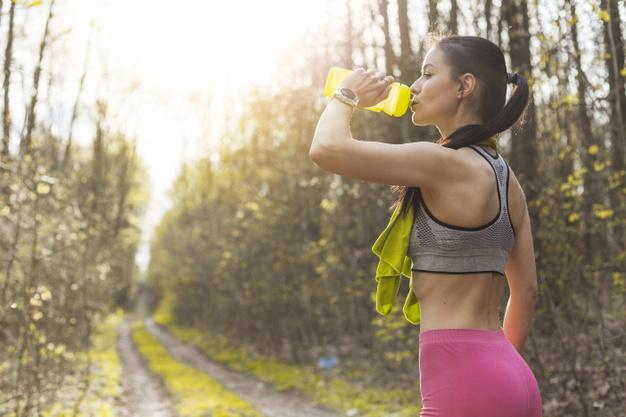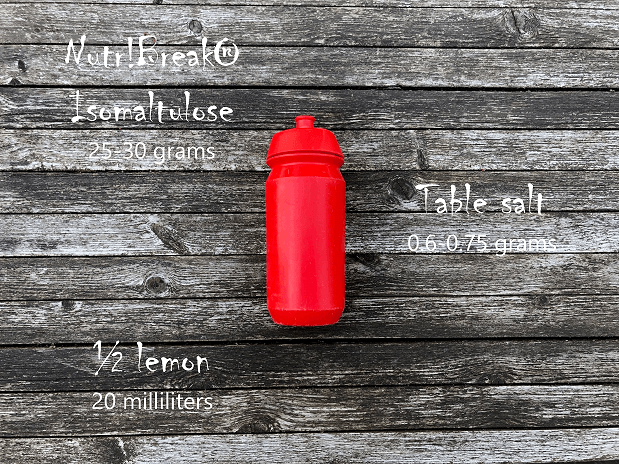
Isomaltulose during exercise
The use in sports drinks
I am regularly asked how much isomaltulose you should dose in your sports drink? And how much should you drink while exercising? How do you combine this with a fresh taste? And what about those salts? So it's time to put it all together…
The essence of a sports drink
A sports drink essentially fulfills 3 tasks:
- providing sufficient moisture to prevent dehydration;
- supplying sufficient sugars as fuel;
- replenishing salt loss as a result of perspiration.
Not meeting any of the above can have a serious impact on your sports performance.
Hydrate, hydrate, hydrate, …
Dehydration is enemy n°1 of every athlete. If you lose 1-2% moisture, your sports performance will suffer. For an athlete weighing 75 kilograms, this means 0.75-1.5 liters of fluid. Especially in warm conditions you sweat this amount easily. Know that more than 3% fluid loss can even pose medical risks.
It is crucial to drink enough during exercise. On average, you quickly lose 0.5-1.5 liters of fluid per hour, depending on genetic predisposition, weather conditions, sports intensity, etc. It is important to replenish these quantities, especially during prolonged efforts.
Weigh yourself just before and just after your training session, and add to this difference the amount of drink you drank during the session and divide by the number of training hours. By doing this you can easily determine your perspiration level (litres/hour) and adjust your fluid intake accordingly.

Energy, energy, energy, ...
You get energy from carbohydrates and fats present in your body. The higher the sport intensity and the shorter the effort, the greater the proportion of carbohydrates in the energy supply. However, our body only has a limited carbohydrate reserve in the form of muscle and liver glycogen. Especially with longer efforts (> 1 hour) it is necessary to take extra energy to provide your muscles with sufficient fuel. After all, when glycogen reserves are exhausted, the body has to rely completely on the fats present, but these are insufficient to maintain a high training intensity.
It is desirable to "eat" extra carbohydrates. A general guideline: 50-70 grams/hour, increasing to 90 grams/hour for longer high-intensity efforts (>4 hours).
Example: If you drink 1 liter of sports drink per hour, it ideally contains 5-6% Nutr!Break® Isomaltulose (50-60g/L). In addition, you can take 1 bar of Nutr!Break® Sport Fruit every hour to further replenish your fuel tank. If you only drink 0.5 liters (lower perspiration), you can consume an extra fruit bar to still take the same amount of sugars per hour.
By including low-glycemic sugars, you also avoid the sugar dip (energy dip). In addition, you also ensure a higher proportion of fat burning in your energy supply so that you can live longer on the same number of carbohydrates during exercise. Hence, a double win!
It is important to mention that the sugar content of your sports drink should not exceed 7-8%. After all, too high a content of sugars causes them to be absorbed less well and also results in a lower hydration rate. In this case we speak of hypertonicity.
And what about the salts?
During exercise we not only lose fluids, but also a lot of salts, especially sodium. An athlete loses no less than 0.4 to 1.6 grams of sodium per liter of sweat (= 1 to 4 grams of table salt/litre). It is therefore important to replenish these salts as they play an important role in the functioning of our body, including our fluid balance and sugar absorption. Especially with prolonged efforts (> 1 hour) and with heavy perspiration, a lack of salts will strongly influence sports performance (hyponatraemia).
However, standard drinking water does not contain enough salts and these should therefore be added to your sports drink. You can of course just add table salt or sea salt. After all, the majority of the salts in our sweat consist of sodium chloride (= table salt). Or you can use salt tablets (hydrotabs, electrolyte tablets, ...), which, in addition to sodium, also contain a certain amount of potassium, calcium and magnesium and also add a taste to your tailor-made sports drink.
If you want to keep it simple and natural, add some lemon or lime juice in addition to the table salt (1.2-1.5 grams/litre) for a fresh taste and extra vitamin C, which helps against fatigue.
In the supermarket you will also find a lot of concentrated aromas (e.g. Teisseire Mix & Go) to bring variety to your customized sports drink.
Now you have all the information needed to put together the perfect sports drink adapted to your needs. 😊








